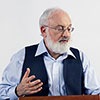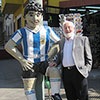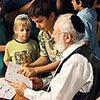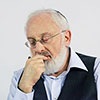

Preparation to the Daily Kabbalah Lesson
Download: WMV Video | MP3 Audio
Baal HaSulam, Letter #47, 1927
Download: WMV Video | MP3 Audio
“Preface to the Wisdom of Kabbalah,” Item 42, Lesson 16
Download: WMV Video | MP3 Audio
Article “Body and Soul,” Lesson 2
Download: WMV Video | MP3 Audio
The Book of Zohar selections, Chapter “Noah,” Item 482
Download: WMV Video | MP3 Audio
 The only thing that can help one study and reveal The Book of Zohar is constant exercises where the reader longs to feel the text within himself. Otherwise this book will remain forever closed to him.
The only thing that can help one study and reveal The Book of Zohar is constant exercises where the reader longs to feel the text within himself. Otherwise this book will remain forever closed to him.
If we only remove this “plug” from our sensations, we will open up the path for the higher, spiritual sensations to stream down to us from Above. Then our inner world will be revealed to us.
In this manner, day in and day out, one must doggedly await the emergence of an inner response to the words of The Zohar. And then, like a child discovering the world, impressions of that higher reality (the Upper World) that is hidden inside us will spontaneously “surface” from within.
 A question I received: Why is it that despite my ability to feel other people’s desires, I continue to think mostly of myself? How do I resolve this conflict?
A question I received: Why is it that despite my ability to feel other people’s desires, I continue to think mostly of myself? How do I resolve this conflict?
My Answer: You only think of others because you want to use them for your own benefit. Therefore, it’s obvious that you feel them and would even like to strengthen this ability.
If I want to deceive someone, I have to have a good sense of that person and understand them well. In order to trick someone I have to become a good psychologist and penetrate into their mind and heart. Then I will know how to manipulate them to my benefit.
The ability to sense others doesn’t necessarily indicate anything. What matters is whose desires are more significant to you – yours or theirs?
It is written: “Do not do unto others what you do not want others to do unto you,” which means that you should not use your neighbor for the purpose of advancing your own interests. But later it was written: “Love your neighbor as yourself.” Does the phrase “as yourself” mean that half of the profit should go to me and half to him? No! It means that you should love only your neighbor the way you previously loved only yourself.
From now on, you have to start treating yourself the same way as you previously treated your neighbor when you took advantage of him. You have to start thinking about how you can use yourself in order to be of service to him.
You switch places: He takes your place and you take his. Your neighbor becomes more important to you than yourself. That’s what we call “bestowal.”
There is just one example of this interaction between people in our world: a mother and her child. When we make the transition to sensing others, we acquire the ability to begin sensing our own soul. This is actually the only way to feel it, since our soul consists of desires that are outside of us. By feeling those external desires, you can begin to feel the Creator within them.
 A human being begins his path like a little animal that can only sense whether it feels well or poorly. This is how one feels the Light in the Kli – in his desire. However, gradually new Reshimot (informational data) are revealed in him, and in addition to feeling good or bad, these Reshimot cause a person to make an additional analysis of true and false.
A human being begins his path like a little animal that can only sense whether it feels well or poorly. This is how one feels the Light in the Kli – in his desire. However, gradually new Reshimot (informational data) are revealed in him, and in addition to feeling good or bad, these Reshimot cause a person to make an additional analysis of true and false.
The feeling of good or bad is natural for the created being. All forms of creation react to negative or positive influences: they contract or widen, the way inanimate objects open and close, a flower lives and dies, and so does an animal. This is matter’s natural reaction to the Light’s presence or absence.
However, when the created being begins to reveal its dependence on the environment and to connect it to the feelings of good or bad, then an additional perception of “true and false” begins to appear in him. Thus, he begins to have two different approaches or analyses of his state, which depends on the environment and on himself. We make the assessment of true and false with respect to the benefit of the society, and good and bad (sweet versus bitter) with respect to our own well-being. Based on this clarification between the external and the inner desire (Kli), we develop the “human being,” Adam (similarity to the Creator) in us.
A human being differs from the animal in us because the human being’s perception takes place “outside,” in the society that surrounds him. A human being is able to feel the Creator, the Upper One, that which exists outside of one’s body. But actually, the environment, the society, and the Creator are the same thing.
This is because in regard to our egoism, everything that exists outside is the same. The perception of the external compared to the perception of the self is what separates spiritual development from corporeal development.
 The Zohar: The illumination of the head of the Partzuf Atik of the World of Atzilut, called “the unattainable head,” is Infinity. It is the source of the small and great states of three heads (systems of governance) of Arich Anpin, called Keter, Mocha de-Ovira (the brain membrane) and Mocha Stima (a concealed mind), which is the Yud Hey Vav of Zeir Anpin itself.
The Zohar: The illumination of the head of the Partzuf Atik of the World of Atzilut, called “the unattainable head,” is Infinity. It is the source of the small and great states of three heads (systems of governance) of Arich Anpin, called Keter, Mocha de-Ovira (the brain membrane) and Mocha Stima (a concealed mind), which is the Yud Hey Vav of Zeir Anpin itself.
The Book of Zohar consists of different parts. Some of them use the dry language of Kabbalah, while others are more lively, narrating in the language of the Bible or legends. However, we should not pay attention to the words themselves. I don’t care which words I am hearing. After all, the Kabbalists took words from this world, but what is important for us is to receive an inner response, a certain sensation instead of the words. The word itself is not really connected to that sensation.
Baal HaSulam writes in Item 155 of the “Introduction to Talmud Eser Sefirot” that we attract the Surrounding Light by having a great desire and aspiration to understand what we study, where “understanding” means being inspired, receiving an impression, and connecting to something. It is written, “And Adam knew Hava,” which means that they acquired an inner connection. Knowledge does not play any role here; only desire does.
Instead of hearing the words, we should desire to feel what is happening inside us. Then we will be focusing on the most important thing. The spiritual world cannot be attained through the mind. You need new vessels of perception, new senses (Kelim) that develop only by virtue of your aspiration. Your aspiration is what attracts the Light that Reforms, the Surrounding Light.
The dry words written in The Zohar using the language of Kabbalah may not inspire us and may leave us feeling dry; but if in spite of these dry words we still try to find the sensation and picture that must appear before us, then the things written in the language of Kabbalah end up being more beneficial for us than the texts that are written in the language of the Bible or legends. Therefore, even though the language of Kabbalah is dry, it is the one that awakens the greatest desire in a person who wants to advance.
 A person’s entrance into spirituality does not at all depend on whether he knows the structure of the spiritual systems described by The Book of Zohar, or whether he understands what he reads or not. On the contrary, knowledge and understanding can be an obstacle keeping him back him from being able to feel the spiritual world.
A person’s entrance into spirituality does not at all depend on whether he knows the structure of the spiritual systems described by The Book of Zohar, or whether he understands what he reads or not. On the contrary, knowledge and understanding can be an obstacle keeping him back him from being able to feel the spiritual world.
We enter spirituality like a baby that comes into this world and starts to feel something very unusual. First he feels, and only later does he begin to understand the connections between the things he feels. He presses a button, and a toy moves, he pulls a handle, and a door opens, and so on. We are the same and so first must develop the sensation then later the knowledge.
 When we read about the structure of the Upper Systems in The Book of Zohar, the most important thing is to always think about where these systems are found. They are inside each one of us, and we have to reveal them.
When we read about the structure of the Upper Systems in The Book of Zohar, the most important thing is to always think about where these systems are found. They are inside each one of us, and we have to reveal them.
When we hear the names of the Partzufim, Sefirot and various actions (such as Atik, Arich Anpin, Parsa separating one from the other, ascents, descents, unifications, divisions), we should be waiting for just one thing to happen: “When will I feel that this is all happening inside me!? Where are these qualities and actions within me, within my sensations? Oh – here’s Atik, and there’s Arich Anpin, and here, in the middle, is Parsa. And it’s the Parsa that isn’t letting me feel it!”
All of this has to be revealed inside us, because spirituality is inside of us. We think that the spiritual world is somewhere far away, in some kind of other realm. However, when we study about perception of reality, we learn that all of reality is perceived inside us, and spirituality is perceived as the deepest, innermost layer within us.
That is why each one of us has to be like a surgeon that is going inside in order to discover the Upper System described by The Book of Zohar. We are trying to find it at the very depth of our sensations. Then, when reading phrases like, “the Upper Plan,” “RADLA,” “Atik,” “Arich Anpin,” and “ascent to Keter,” we will be able to feel how all of it is happening inside us. You have to desire for every word written in The Book of Zohar to evoke a response and sensation in you. When you constantly work on this, it means that you are really trying to reveal spirituality. We should never forget about this!
Before every lesson and every excerpt we read in The Book of Zohar, we have to return to the right intention and remember that we are now studying the inner part of the Torah, the Torah’s internality, which becomes revealed inside a person. We have different thoughts, desires and qualities, and the spiritual reality that we read about in The Book of Zohar becomes revealed at their very depth. That is why all our attention and all our expectations should be focused on what we are about to reveal inside us. This should be our primary concern and we should always be thinking about this, trying to discern inner movements and reactions to the words we read. Even if you just imagine them – it doesn’t matter; the most important thing is to try and feel these inner movements inside you.
This aspiration in and of itself is already a prayer. First we have to get used to treating the text in this way, and later we will add to this habit a connection among us. In the end, The Book of Zohar was written only in order to create a connection between us. But this connection does not take place between the bodies; it transpires inside each one of us – between the points of all the souls, which are all inside me as well. I have to build this connection inside me: a connection between the image of “myself” and the image of “everyone else.” Inside this connection, which I create within, I will build my spiritual vessel of perception (Kli), and in it, I will reveal spirituality.